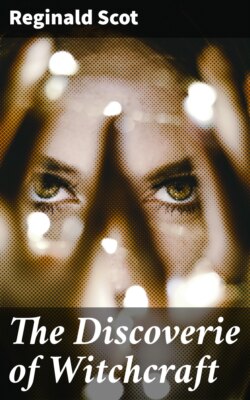Читать книгу The Discoverie of Witchcraft - Reginald Scot - Страница 54
На сайте Литреса книга снята с продажи.
The eleventh Chapter.
ОглавлениеTable of Contents
The strange and divers effects of melancholie, and how the same humor abounding in witches, or rather old women, filleth them full of mervellous imaginations, and that their confessions are not to be credited.
UT in truth,H. Card. de var. rerum. cap. 8. Jo. Wierus de præst. lib. 6. cap. 8. this melancholike humor (as the best physicians affirme) is the cause of all their strange, impossible, and incredible confessions:/47. which are so fond, that I woonder how anie man can be abused thereby. Howbeit, these affections, though they appeare in the mind of man, yet are they bred in the bodie, and proceed from this humor, which is the verie dregs of bloud, nourishing and feeding those places, from whence proceed feares, co/gitations,58. superstitions, fastings, labours, and such like.
This maketh sufferance of torments, and (as some saie)Aristotle de somnio. foresight of things to come, and preserveth health, as being cold and drie: it maketh men subject to leanenesse, and to the quartane ague. TH. Card. lib. 8 de var. rer.hey that are vexed therewith, are destroiers of themselves, stout to suffer injuries, fearefull to offer violence; except the humor be hot. They learne strange toongs with small industrie (as Aristotle and others affirme.)
If our witches phantasies were not corrupted, nor their wils confounded with this humor, they would not so voluntarilie and readilie confesse that which calleth their life in question; whereof they could never otherwise be convicted. J. BodinJo. Bod. contra Jo. Wierum. with his lawyers physicke reasoneth contrarilie; as though melancholie were furthest of all from those old women, whom we call witches: deriding the most famous and noble physician John Wier for his opinion in that behalfe. But bicause I am no physician, I will set a physician to him; namelie Erastus, who hath these words, to wit, that These witches, through their corrupt phantasie abounding with melancholike humors, by reason of their old age, doo dreame and imagine they hurt those things which they neither could nor doo hurt; and so thinke they knowe an art, which they neither have learned nor yet understand.
But whie should there be more credit given to witches, when they saie they have made a reall bargaine with the divell, killed a cow, bewitched butter, infeebled a child, forespoken hir neighbour, &c: than when she confesseth that she transubstantiateth hir selfe, maketh it raine or haile, flieth in the aire, goeth invisible, transferreth corne in the grasse from one field to another? &c. If you thinke that in the one their confessions be sound, whie should you saie that they are corrupt in the other; the confession of all these things being made at one instant, and affirmed with like constancie, or rather audacitie? But you see the one to be impossible, and therefore you thinke thereby, that their confessions are vaine and false. The other you thinke may be doone, and see them confesse it, and therefore you conclude, A posse ad esse; as being persuaded it is so, bicause you thinke it may be so. But I saie, both with the divines,August. lib. de Trinit. 3. Idem. de civit. Dei. Clemens. recogn. 3 Iamblichus. Jo. Wierus. Cardanus. Pampia &c. and philosophers, that that which is imagined of witchcraft, hath no truth of action; or being besides their ima/gination,59. the which (for the most part) is occupied in false causes. For whosoever desireth to bring to passe an impossible thing, hath a vaine, an idle, and a childish persuasion, bred by an unsound mind: for Sanæ mentis voluntas, voluntas rei possibilis est; The will of a sound mind, is the desire of a possible thing./48.
